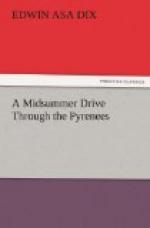[2] INGLIS: Switzerland and the South of France.
In these little coves now float idle pleasure-boats, bright with paint and listless awnings, and ready to be manned by their stout Basque rowers. Here, too, are the fishermen’s cabins, snugly built in against the rocks, and garnished with baskets and poles, and with men repairing their nets. The irregular curves of the bluff, broken here into abrupt and dislocated masses, lend themselves readily to winding paths, and we ramble on, curving upward and downward, over short bridges and through little tunnels under the rocks, each turn giving a new view of the bay or the town.
Finally we round another promontory, cross a last bridge to a large rock-islet standing out from the mainland, and lo! the crescent of the coast is completed, and far to the south we see a low mountain ending the curve; it is Spain.
IV.
In the dreamy summer stillness, we sit with, content, looking at those distant hills, listening to the lapping of the waves, watching the sun sink lower toward the sea. The afternoon sunlight makes a glade across the waters,—seeming to one from a western sea-board like some strange disarrangement in the day.
[Illustration: “HERE TOO ARE THE FISHERMEN’S CABINS.”]
The rounded mountains before us are indeed in Spain, a communicative fisherman tells us. At the foot of the outermost, eighteen miles away, is hidden the old Spanish town of Fuenterrabia. On its other side, in a hollow of the coast, lies San Sebastian. Nearer us, though well down along the sweep of the grey clay bluffs, is St. Jean de Luz, which, with the others, lies on our intended way.
We seem to see, conforming to the crescent of that foreign coast, the menacing crescent of the Armada, parting from Spanish shores, just three hundred years ago to a month, to crush Anglo-Saxon civilization. There before us lies the land of intolerance and bigotry which gave it being, the land of Philip the Second and his Inquisition. But for Drake and Howard and England’s “wooden walls,” events would have moved differently during the last three centuries,—in our country as in theirs.
V.
The last spark of the sun has disappeared in the water. We turn into the town in the fading light, passing another large bathing pavilion in a sheltered cove, and saunter homeward through an undulating street, the aorta of Biarritz. It is not a wide street, but it is busy and brisk, and it has a refurbished look like newly scoured metal. Neat dwelling-houses, guarded behind stone walls and well-kept hedges, display frequent signs of furnished apartments to let Small and large shops alternate sociably in the line; there is the epicerie or grocery-store, with raisins and olives and Albert biscuits in the window; next is a lace and worsted shop, where black Spanish nettings vie with gay crotchet-work,—




